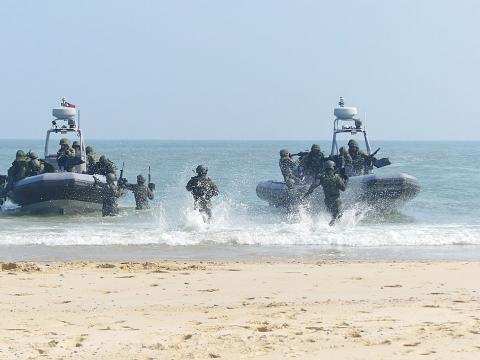The Ministry of National Defense yesterday — a week after Chinese President Xi Jinping (習近平) reasserted China’s right to use force against Taiwan — made public this year’s schedule of combat drills designed to boost the military’s readiness.
The annual exercises are divided into four components, Operations and Planning Division head Major General Yeh Kuo-hui (葉國輝) said.
A month of combat readiness training is to be held in the first quarter, the month-long Han Kuang live-fire exercise in the second quarter, joint anti-landing operations in the third quarter and joint anti-airborne exercises in the fourth quarter, Yeh said, without giving a more detailed timetable.

Photo: Wu Cheng-ting, Taipei Times
The drills and training routines would incorporate newly adopted tactics for defending against a possible Chinese invasion, Yeh said.
Over the past few decades, the armed forces made beach invasions the focal point of any defensive strategy, but when President Tsai Ing-wen (蔡英文) took office in May 2016, the plan for repelling a possible attack was broadened to include the outer perimeter of the nation’s coastal areas.
The military’s combat exercise schedule for this year was announced a week after Xi on Wednesday last week reissued a warning to Taiwan in an address marking the 40th anniversary of China’s “Message to Compatriots in Taiwan.”
In his speech, Xi said that China is willing to talk with any party in Taiwan to push forward the process of peaceful unification on the basis of the “one China” principle.
However, “we make no promise to renounce the use of force and reserve the option of taking all necessary means” to serve the end, Xi added.
Asked about Xi’s threat, military spokesman Major General Chen Chung-chi (陳中吉) said the training and drills being conducted are intended to prepare the armed forces to counter a possible invasion.
“We want to assure citizens that the military is constantly improving its combat preparedness and stands ready to fight for the survival of the Republic of China,” he said.

SECURITY: As China is ‘reshaping’ Hong Kong’s population, Taiwan must raise the eligibility threshold for applications from Hong Kongers, Chiu Chui-cheng said When Hong Kong and Macau citizens apply for residency in Taiwan, it would be under a new category that includes a “national security observation period,” Mainland Affairs Council (MAC) Minister Chiu Chui-cheng (邱垂正) said yesterday. President William Lai (賴清德) on March 13 announced 17 strategies to counter China’s aggression toward Taiwan, including incorporating national security considerations into the review process for residency applications from Hong Kong and Macau citizens. The situation in Hong Kong is constantly changing, Chiu said to media yesterday on the sidelines of the Taipei Technology Run hosted by the Taipei Neihu Technology Park Development Association. With

CARROT AND STICK: While unrelenting in its military threats, China attracted nearly 40,000 Taiwanese to over 400 business events last year Nearly 40,000 Taiwanese last year joined industry events in China, such as conferences and trade fairs, supported by the Chinese government, a study showed yesterday, as Beijing ramps up a charm offensive toward Taipei alongside military pressure. China has long taken a carrot-and-stick approach to Taiwan, threatening it with the prospect of military action while reaching out to those it believes are amenable to Beijing’s point of view. Taiwanese security officials are wary of what they see as Beijing’s influence campaigns to sway public opinion after Taipei and Beijing gradually resumed travel links halted by the COVID-19 pandemic, but the scale of

TRADE: A mandatory declaration of origin for manufactured goods bound for the US is to take effect on May 7 to block China from exploiting Taiwan’s trade channels All products manufactured in Taiwan and exported to the US must include a signed declaration of origin starting on May 7, the Bureau of Foreign Trade announced yesterday. US President Donald Trump on April 2 imposed a 32 percent tariff on imports from Taiwan, but one week later announced a 90-day pause on its implementation. However, a universal 10 percent tariff was immediately applied to most imports from around the world. On April 12, the Trump administration further exempted computers, smartphones and semiconductors from the new tariffs. In response, President William Lai’s (賴清德) administration has introduced a series of countermeasures to support affected

Pope Francis is be laid to rest on Saturday after lying in state for three days in St Peter’s Basilica, where the faithful are expected to flock to pay their respects to history’s first Latin American pontiff. The cardinals met yesterday in the Vatican’s synod hall to chart the next steps before a conclave begins to choose Francis’ successor, as condolences poured in from around the world. According to current norms, the conclave must begin between May 5 and 10. The cardinals set the funeral for Saturday at 10am in St Peter’s Square, to be celebrated by the dean of the College